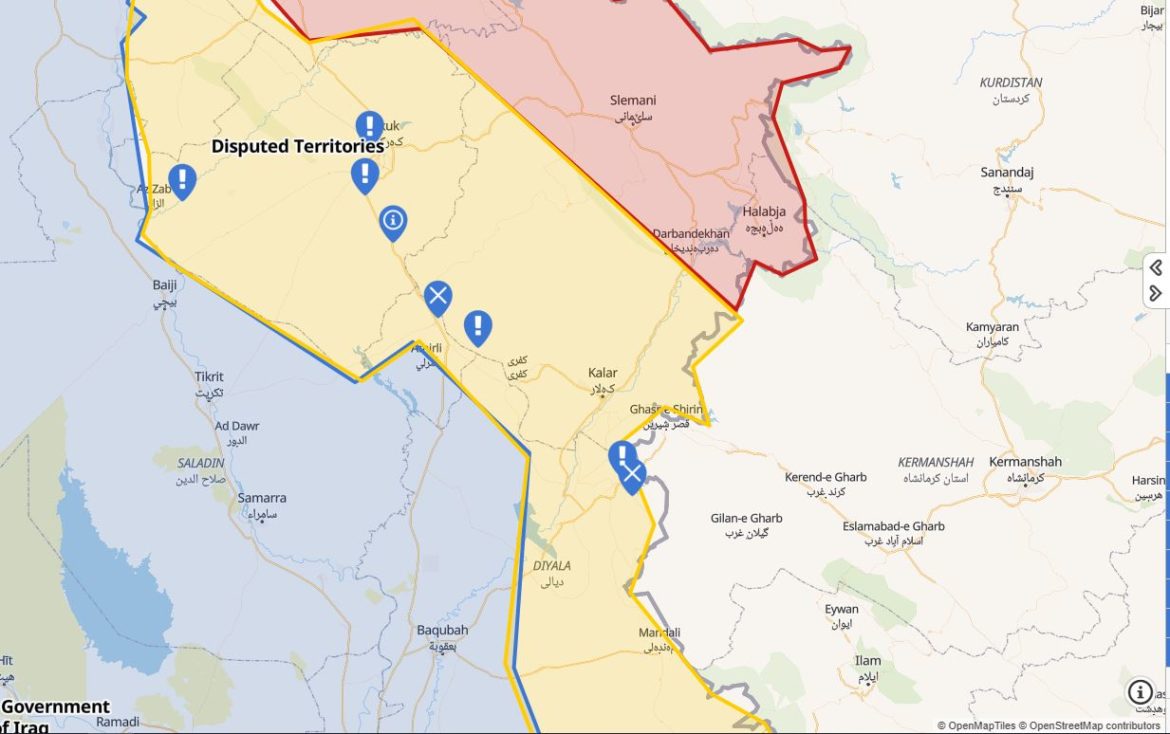1.3K
A weekly brief of events and news occurred in the disputed territories.
Kirkuk
- The tension between the Kirkuk administration and the people in the Daquq district continued after the acting governor, Rakan al Jabouri, approved the mayor appointed by the Iraqi prime minister, Mohammed Shia’ Al Sudani. Last month, al Jabouri appointed Saadoun Hammadi Majid as the mayor of Daquq, which caused Kurdish and Turkmen protests, and eventually al Sudani canceled the decision. On February 5, al Sudani appointed a new mayor named Abdualstar Ali Mahmoud, angering residents who marched to city offices, prompting the new mayor to flee. Kurdish and Turkmen residents then went on strike in front of the mayor’s office. On February 6, a meeting was held at Kirkuk’s governorate headed by al Jabouri, the Kirkuk military commander, Daquq partisans, and public figures. At the meeting they decided the new mayor would carry out administrative duties in the provincial building until the residents of Daquq appoint someone agreeable to all players. Meanwhile, on February 7, representatives of the Kurdish and Turkmen communities of Daquq met and agreed to cooperatively resolve the issue to reach a consensus and said, “any imposed decision will not be accepted.”
- On February 7, Meteorological Agency official warned that Khanaqin and Badr districts – as well as Kirkuk, Nineveh, and Nasiriyah provinces – are among the areas that are likely to experience additional earthquakes. The officials said an earthquake measuring 4.7 on the Richter scale struck Badra and Khanaqin last week. The quake in the Kurdish regions of Turkey and Syria resulted in the halting of oil exports via the international Cihan terminal. Although the Kurdistan Regional Government (KRG) resumed oil exports yesterday, Kirkuk oil exports did not resume until the evening of February 8.
- Sahira Abdullah Gharb, a Sunni Arab lawmaker from the Hawija district, wrote a memorandum to the Iraqi prime minister, bashing the acting governor al Jabouri for violating his powers. Gharb described al Jabouri as “a dictator” who ignores the role of parliamentarians in their “monitoring role.” According to the lawmaker, al Jabouri has taken advantage of his position within the mandated Arab portion of parliament and has appointed personal connections to high governmental posts, including the new mayor of the Abbasi district. In response, the Arab Council in Kirkuk, headed by al Jabbari, rejected the accusations and called on the speaker of the House of Representatives to hold Gharib accountable. At the same time, divisions among the Turkish-backed politicians became apparent when a Shiite Turkmen lawmaker, Gharib Askar, suspended his membership in the Turkmen parliamentary bloc. Askar accused the bloc’s leadership of “exclusivity and exploitation.” Askar is backed by Shiite parties in Iraq aligned with Iran. Moreover, the ultra-nationalist Turkman lawmaker, Arshad al Salihi, accused the coalition forming the Iraqi government as “the worst government against the Turkmen of Iraq.”
- On February 5, a military delegation led by Brigadier General Qais Khalaf Mahmadawi, deputy commander of Iraqi operations, arrived in Kirkuk. According to leaked information, the delegation had visited the city to discuss handing over security files to local police, especially as the interim government opposes the issue. Separately, on February 3, Kirkuk intelligence officers and employees were distributed to checkpoints in Kirkuk to “prevent” dollar smuggling. The move comes after the prime minister ordered checkpoints to be established and anyone found with more than $10,000 USD arrested. The measures caused significant traffic backup.
Khanaqin
- On February 3, the Integrity Commission of the Diyala Provincial investigation department summoned the mayor of Khanaqin on charges related to the disappearance of 900 caravans from a displaced persons camp. According to the committee, 900 caravans in the Alwand camps disappeared, along with electricity poles and shelters, soon after the displaced people returned. The mayor was summoned under Article 340 of the Iraqi Penal Code, which punishes civil servants with up to six years in prison if they are found to have damaged public property.
Tuz Khurmatu
- ISIS (Da’esh) terrorists kidnapped a young Kurdish man named Bahman Hussein near the Lak bridge between Kifri and Tuz Khurmatu districts on Saturday evening. According to Bahman’s relatives, after his disappearance, the terrorists called them on his phone and demanded ransom for his release.
- On February 4, Iraqi Rapid Response Forces withdrew from the Kurdish neighborhoods and were replaced by the Federal Police. After October 16, 2017 – and the burning and looting of a large number of houses and shops of Kurdish citizens – Baghdad deployed rapid response forces to the city’s Kurdish neighborhoods. Many Kurds were, and continue to be, displaced by the Iranian-backed militias, and very few Kurdish-owned homes have been returned to their owners – instead, Kurdish homes have been utilized by state security forces.
Shingal (Sinjar)
- On February 2, Richard Mills, the United States Deputy ambassador to the United Nations (UN), called for implementing the security agreement between Erbil and Baghdad on the district in “close consultation with the Yazidi community.” The district remains a three-way nexus of conflict, and struggles to provide primary services to residents. On February 8, the Iraqi prime minister’s office said al Sudani expressed his government’s intention to establish a fund for the reconstruction of Shingal (Sinjar) and the Nineveh Plains; it’s not clear, however, when and how the fund reconstruction project will take place.

